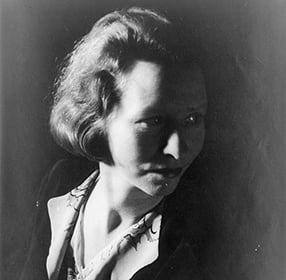[Say what you will, and scratch my heart to find]
Say what you will, and scratch my heart to find
The roots of last year’s roses in my breast;
I am as surely riper in my mind
As if the fruit stood in the stalls confessed.
Laugh at the unshed leaf, say what you will,
Call me in all things what I was before,
A flutterer in the wind, a woman still;
I tell you I am what I was and more.
My branches weigh me down, frost cleans the air.
My sky is black with small birds bearing south;
Say what you will, confuse me with fine care,
Put by my word as but an April truth,—
Autumn is no less on me that a rose
Hugs the brown bough and sighs before it goes.
This poem is in the public domain. Published in Poem-a-Day on August 24, 2024, by the Academy of American Poets.
“[Say what you will, and scratch my heart to find]” is the eighth and last sonnet featured by Edna St. Vincent Millay in the anthology American Poetry, 1922: A Miscellany (Harcourt, Brace and Company, 1922). In 1927, The English Journal published “Edna St. Vincent Millay,” an essay by poet and literary critic Edward Davison. Davison praised and criticized Millay, stating, “Miss Millay’s metrical facility is usually clever enough to conceal her verbal lapses from a hasty reader. Her best work is written in an unfaltering, precise, and slightly epigrammatic style that weighs every word even when, as occasionally, it forgets to weigh the phrase.” Despite Millay’s popularity and winning a Pulitzer Prize for her poetry collection The Ballad of the Harp-Weaver (Flying Cloud Press, 1922), Davison concluded his essay with: “[Millay’s] work is not the poetic expression of some more or less consistent scheme of values, like the work of Mr. A. E. Housman, Mr. Robert Frost, Mrs. Browning […]. It has no scale to measure the world. Lacking that, a poet cannot even approach greatness.” In 1943, Millay won the Robert Frost Medal from the Poetry Society of America for her lifetime service to American poetry.

